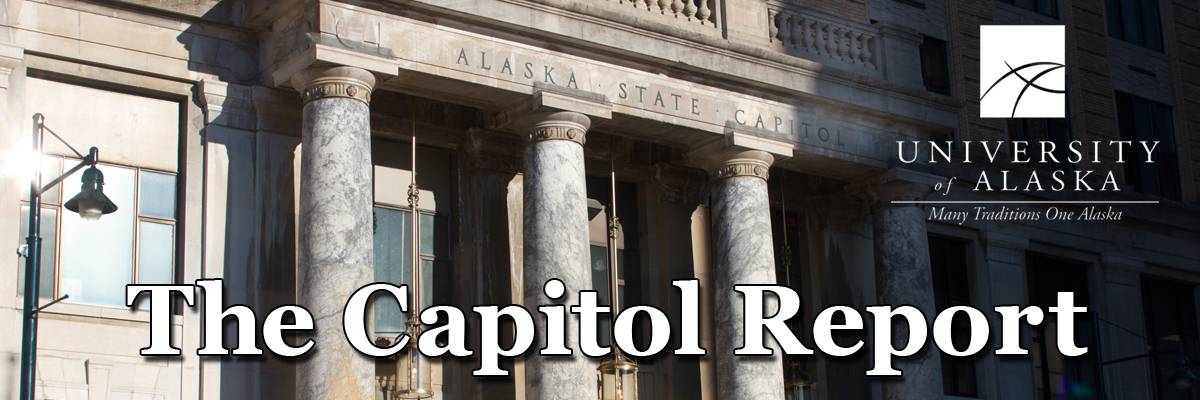Capitol Report: May 21

May 21, 2020
Capitol Report: Legislature Adjourns Sine Die
The 31st Alaska Legislature adjourned sine die yesterday, marking the end to one of the most
unusual and shortest sessions in recent memory. On Monday, lawmakers reconvened in
Juneau to ratify the spending plan proposed by Governor Dunleavy for federal funding
received through the Coronavirus Aid, Relief and Economic Security (CARES) Act.
The Legislative Budget and Audit (LB&A) Committee previously approved the plan earlier this month. However, legislation
(House Bill 313) became necessary in part due to a lawsuit filed questioning the legality of the
committee’s action. The House passed the legislation on Tuesday and adjourned, and
the Senate followed on Wednesday morning after several attempted amendments by Senator
Lora Reinbold. From the initial CARES Act funding, the University of Alaska will receive
$10.5 million from the Higher Education Emergency Relief Fund and $1.7 million from the Governor’s Emergency Education Relief Fund. You can watch
the Senate floor debate here.
The adjournment ends the Legislature’s business for the near future. However, they
will still need to reconvene later in the year for a joint session to consider the
Governor’s appointees to state boards and commissions. Student Regent Cachet Garrett,
is one of those awaiting legislative confirmation. Typically, the Legislature votes
on these nominations in a joint session near the end of session, however they were
unable to complete that process due to their early adjournment. Prior to leaving town
in March, lawmakers passed legislation to accommodate this unique situation. The new
law gives the Legislature until the earlier of Jan 18, 2021 or 30-days after the expiration
of the governor's public health emergency declaration (or a proclamation that the
emergency no longer exists). Unless otherwise changed, the current declaration is
set to expire on Nov 15, 2020.
The Legislature’s adjournment also marks the retirement of Representatives Colleen
Sullivan-Leonard of Mat-Su, David Talerico of Healy and John Lincoln of Kotzebue.
We thank them for their service to the State of Alaska.
President Johnsen Announces UA Fall Operations Plan with Governor
UA President Jim Johnsen joined Governor Dunleavy and DEED Commissioner Michael Johnson
at Wednesday’s press conference. The president announced the university’s new operational
plan for fall semester, highlighted UA’s actions to protect our university community,
and shared the substantial contributions UA has made to the state’s COVID-19 response.
The president’s message to the university community about the plan can be found on the university’s updated COVID-19 website. You can watch the press conference here.
Federal COVID-19 Update
Congress has passed four separate supplemental appropriations measures since early
March to address the COVID-19 pandemic. This has provided nearly $3 trillion in aid
to individuals, businesses, health care providers, and state and local governments.
Implementation of the federal programs established in these measures continues at
various levels of the federal government.
Congress continues discussions regarding the next COVID-19 relief package. On May
15, the House of Representatives passed a bill entitled the Health and Economic Recovery Omnibus Emergency Solutions (HEROES) Act. The legislation proposes $3 trillion in new federal spending, nearly as much
as the previous three relief packages combined. The bill includes $26 billion in funding
for public institutions of higher education, with a potential benefit to UA of $56
million. However, the bill also includes a controversial “maintenance of effort” provision.
This requires states to set funding levels for K-12 and higher education in FY20 and
FY21 at the average of the three prior fiscal years (FY17-FY19).
While the CARES Act had a similar provision, it allowed the U.S. Secretary of Education
to grant a waiver to states that have, “experienced a precipitous decline in financial
resources.” On April 23, Governor Dunleavy applied for a waiver to this requirement,
but the State of Alaska has not yet received a response. As currently drafted, the
HEROES Act does not have a similar waiver provision. The Senate is not expected to
take up the legislation in its current form, however the bill will likely be used
in negotiations between the House and Senate later this year.
In spite of the impact that COVID-19 has had on the legislative process, the House
and Senate Appropriations Committees continue their efforts to produce Fiscal Year
2021 appropriations bills. President Johnsen met with the Alaska’s Congressional Delegation
in January to highlight the university’s federal initiative priorities for Fiscal
Year 2021. Throughout the spring, the UA Government Relations team has worked with
the Alaska delegation to refine these requests to be most impactful to the university’s
mission.
